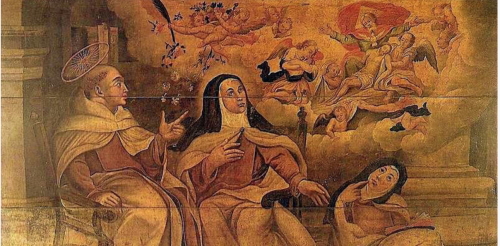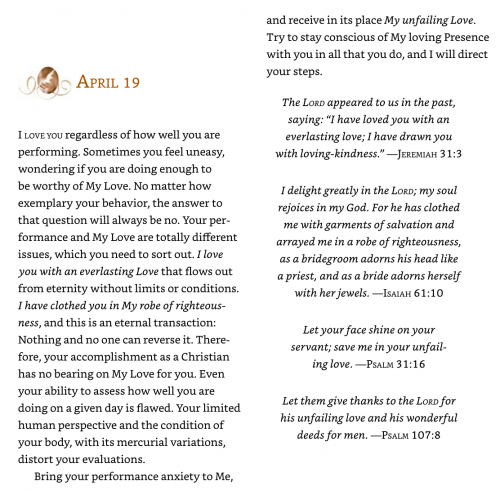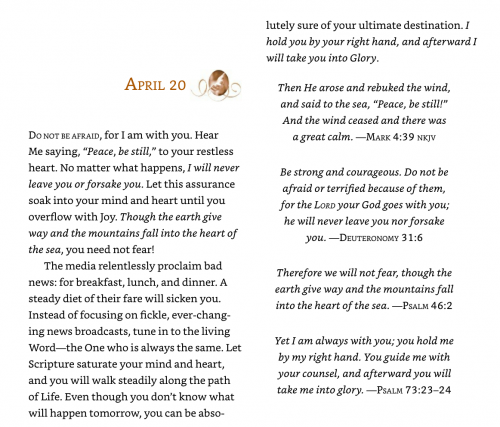
Praying in Our Time
Sunday, April 19, 2020
As of today, like many of you, I have been in self-isolation for several weeks. Honestly, it is a bit like when I sometimes go on a hermitage during Lent; except now, of course, my prayers are with the innumerable people who are ill with COVID-19 and so many who are grieving loved ones who have died. My heart is heavy for the health care workers, first responders, and other essential workers who continue to put themselves at risk every day. I’m also concerned about the many people now facing financial challenges, or whose marginalization has only been made worse by the virus. This type of prayer leads us to experience solidarity with the suffering.
For all the helpers, including people like yourselves who are doing what you can to meet the needs of loved ones and those who are suffering, I offer this excerpt of a prayer from my friend Mirabai Starr, who is a translator of Teresa of Ávila’s works:
You [Teresa] lived that beautiful balance
Between active service
And quiet contemplation.
Teach us to be of use in this troubled world
At the same time that we cultivate
Joyous intimacy
With the Beloved who lives inside us. [1]
I am truly grateful for the people who are living this truth out through their actions in this time of crisis. And there is more we can do, even as most of us stay at home. A few years ago, I wrote, somewhat facetiously, that the Church should close all programs for a year and simply teach people to pray. It seems to me we may unintentionally have just such an opportunity right now, although I sincerely hope it won’t last a year!
In this week’s Daily Meditations, we will meet with two great teachers of prayer, Teresa of Ávila (1515-1582) and John of the Cross (1542–1591). Teresa was canonized (declared a saint) in 1622 and named the first woman Doctor of the Church in 1970. A Doctor of the Church is someone whose teaching can be trusted. Teresa is recognized as the Doctor of Prayer. John, known as the Mystical Doctor, was canonized in 1726 and named a Doctor in 1926.
I like to say that Teresa and John were part of the “final supernova” of nondual, mystical consciousness in 16th-century Spain, before it all but disappeared in Europe for five hundred years in the wake of the Protestant Reformation, the Enlightenment, and the invention of the printing press. Both Teresa and John wrote detailed accounts of their lives and experiences with God, which makes them very accessible guides.
One of Teresa’s most famous teachings is a poem known as “Teresa’s Bookmark” that was found in her own prayer book after her death:
Let nothing disturb you.
Let nothing upset you.
Everything changes.
God alone is unchanging.
With patience all things are possible.
Whoever has God lacks nothing.
God alone is enough. [2]
I hope Teresa’s words will bring you some comfort in this challenging time.
Gateway to Action & Contemplation:
What word or phrase resonates with or challenges me? What sensations do I notice in my body? What is mine to do?
Prayer for Our Community:
O Great Love, thank you for living and loving in us and through us. May all that we do flow from our deep connection with you and all beings. Help us become a community that vulnerably shares each other’s burdens and the weight of glory. Listen to our hearts’ longings for the healing of our world. [Please add your own intentions.] . . . Knowing you are hearing us better than we are speaking, we offer these prayers in all the holy names of God, amen.
Matthew 11:28-30 The Message (MSG)
28-30 “Are you tired? Worn out? Burned out on religion? Come to me. Get away with me and you’ll recover your life. I’ll show you how to take a real rest. Walk with me and work with me—watch how I do it. Learn the unforced rhythms of grace. I won’t lay anything heavy or ill-fitting on you. Keep company with me and you’ll learn to live freely and lightly.”

Courage in Times of Trouble
Monday, April 20, 2020
Tessa Bieleckiis a Christian hermit in the tradition of the Desert Mothers and Fathers. Co-founder of the Spiritual Life Institute, she was a Carmelite monk and Mother Abbess for almost 40 years, establishing experimental monastic communities of men and women in Arizona, Colorado, Nova Scotia, and Ireland. She has written extensively on the life, spirituality, and enduring legacy of Teresa of Ávila. Bielecki writes that Teresa has much to teach us about suffering:
For over forty years, [Teresa] never spent a single day without physical pain. For most of her life she suffered such nausea that she vomited daily and couldn’t eat until noon. She suffered the little illnesses that afflict us all—colds, headaches, stomachaches, toothaches, and flus. But she also suffered from high fevers, fainting spells, heart trouble, neuritis, tinnitus, her maimed left arm, a three-year paralysis, severe convulsions, a four-day coma, and the influenza that almost killed her in 1580, aged her terribly, and left her palsied for the last two years of her life. . . .
As a result of her experience, Teresa teaches us that poor health is not an obstacle to spiritual growth but actually enhances it. Why? We learn patience and surrender. We learn how to transcend the body and rise above both sickness and health altogether. . . .
Through this, as in all else, Teresa learned how to let go of her own will and trust in God. She vehemently asserts that we must “determine once and for all to swallow death and the lack of health,” or there will be no hope for us. [Italics mine.] [1]
In a letter to the convent at Seville that she had founded, Teresa writes:
Courage, courage, my daughters. Remember, God gives no one more troubles than [she] is able to bear, and [God] is with those who are in tribulation. [2]
And in a letter to one of her spiritual directors, the Dominican Father Gracián, she reflects:
One must not think that a person who is suffering is not praying. He is offering up his sufferings to God, and many a time he is praying much more truly than one who goes away by himself and meditates his head off, and, if he has squeezed out a few tears, thinks that is prayer. [3]
Richard again: Suffering, of course, can lead us in one of two directions. It can make us very bitter and close us down, or it can make us wise, compassionate, and utterly open. Our hearts open either because they have been softened, or perhaps because suffering makes us feel like we have nothing more to lose. It often takes us to the edge of our inner resources where we “fall into the hands of the living God” (Hebrews 10:31).
Let us all pray for the grace of this second path of softening and opening.
